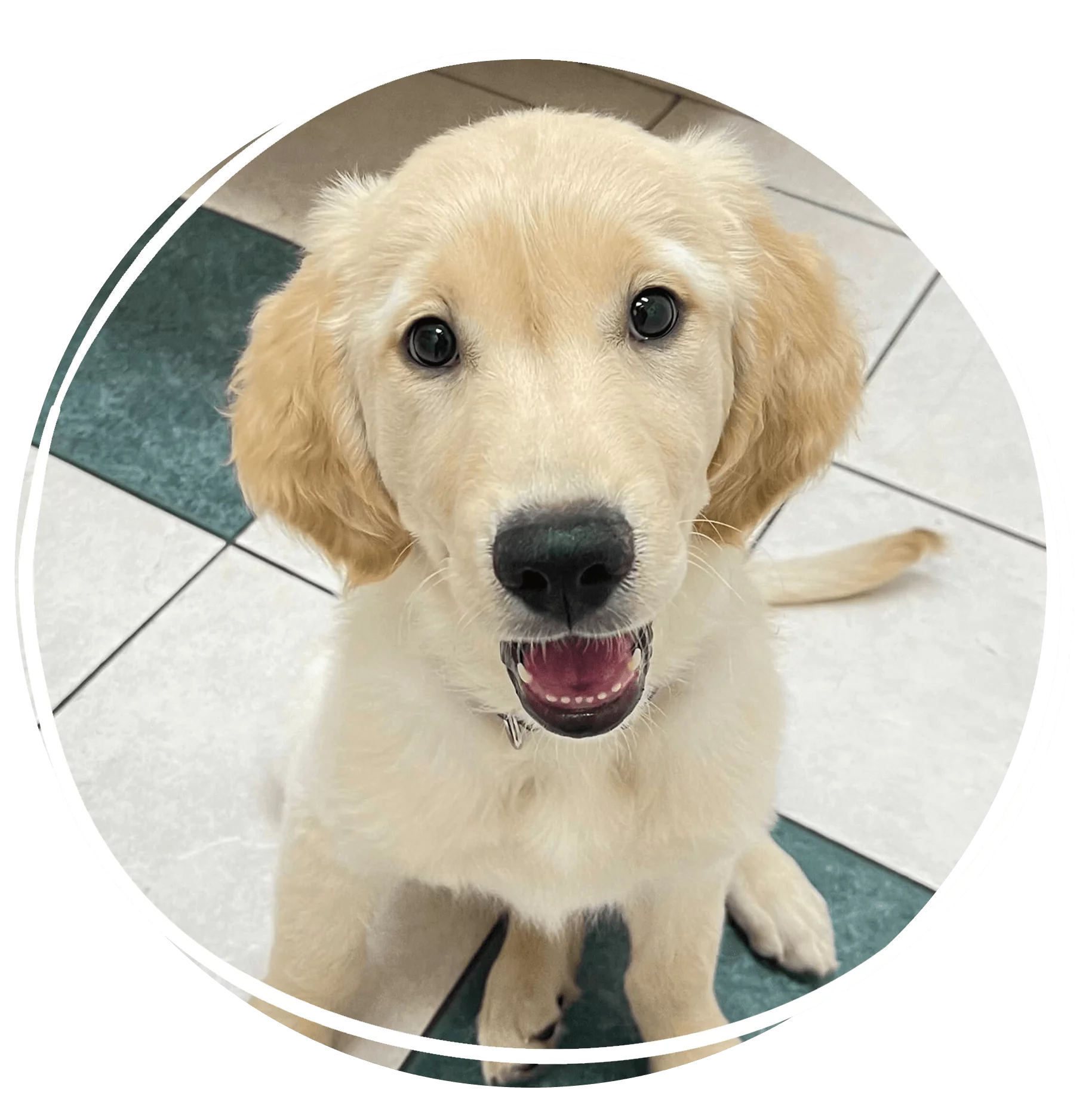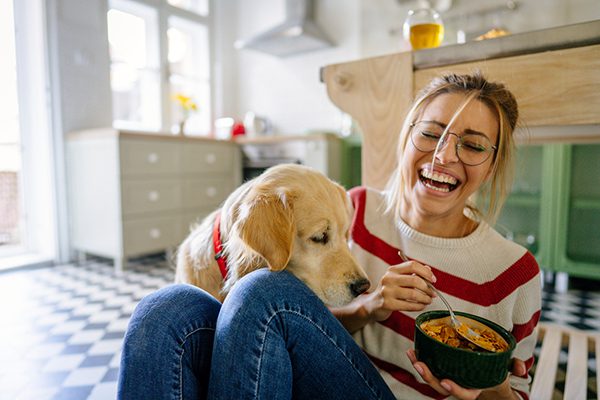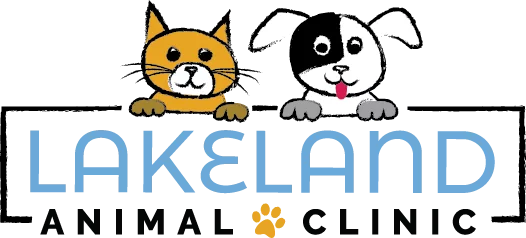
Our Veterinary Blog
What Human Foods Can Dogs Eat?
Many human foods are safe and suitable for your dog in small amounts. Many people’s foods contain plenty of vitamins and minerals that can boost your pup’s overall health. Before you let your dog eat whatever they want, you want to know what is healthy for them.
Foods like peanut butter offer your pup healthy fats and quality protein. There are also a variety of fruits and vegetables that are safe for your dog’s consumption.

It can be fun to offer your pup new foods to try. It must be said that you should talk to your veterinarian before you allow your dog to eat any human foods. Read this article and find out what human foods dogs can eat.
Are Human Foods Safe for Dogs?
Dogs can have certain foods (see video) from each food group.
Many popular commercial dog foods are formulated with some of these human foods. Below is more detail about what human foods your dog can eat.
Vegetables
Dogs can eat certain vegetables, such as broccoli. Broccoli can be beneficial for your pup’s health. Some of the nutrients include:
- Vitamin K
- Vitamin C
- Calcium
- Potassium
- Iron
- Protein
- Folate
These vitamins and minerals assist with preserving healthy bones, muscles and lowering blood pressure. It is also high in fiber, which can be good if your dog is constipated. It helps your pup to eliminate waste efficiently.
Even though broccoli is a healthy snack for dogs, it can also cause gastrointestinal upset. Only give your dog a small amount at a time.
Dogs can also eat corn in small amounts. Some of the nutrients that corn has to offer your pup include:
- Protein
- Linoleic acid
- Fiber
- Lutein
- Vitamin C
- Thiamine
- Folate
- Magnesium
- Potassium
Do not let your dog eat corn on the cob. There is a risk that they can choke on it, and if they consume the cob, it can result in intestinal blockage.
Some other vegetables that are OK for dogs to eat are carrots, cucumbers, green beans, and green peas.
Fruits
There are a variety of fruits that dogs can eat. For example, they can eat apples. Apples have many good nutrients, such as:
- Vitamin A
- Vitamin C
- Fiber
- Potassium
Apples are also suitable for pups because they help to clean their teeth by the act of chewing. They are also a natural breath freshener.
It must be noted that you should remove the core and the seeds before giving your dog an apple.
Apples are also a common ingredient in some dog treats.
Dogs can also eat bananas. Some of the nutrients your dog can benefit from eating bananas include:
- Potassium
- Biotin
- Fiber
- Copper
Fun Recipe: Oatmeal Banana Cookies
If you want to offer your canine a nice little treat that you can share with them, try this recipe for oatmeal banana cookies.
Ingredients:
- 3 cups of oats
- 1 cup of flour
- Two eggs
- Half a cup of honey
- Two mashed bananas
Step 1
You can either mix the ingredients by hand or use a stand mixer. Mix the eggs, honey, and bananas altogether. Add the flour and oatmeal until the ingredients are mixed well. You need to measure and mix.
Step 2
Form the batter into a ball and then roll it out using a rolling pin.
Step 3
When the dough is all rolled out, cut with cookie cutters into fun shapes for your pup. Put cookies on a non-stick cookie sheet and bake at 300 degrees for 25 minutes. Once the cookies cool down, give one to your dog for them to enjoy!
You should know that grapes and raisins are toxic to both dogs and cats. Make sure you keep these foods away from your dog.
Some other fruits that are OK for your dog to eat include blueberries, pineapple, watermelon, and strawberries.
Protein
There is a lot of different proteins that dogs can eat. For instance, they can eat peanut butter. Peanut butter is a treat for dogs, and they love it. Some of the nutrients in peanut butter include:
- Polyunsaturated Fats
- Monounsaturated Fats
- Potassium
- Vitamin E
- Manganese
- Magnesium
Most peanut butter is safe for dogs. However, some peanut butter contains xylitol. The sweetener xylitol is a sugar substitute. It is dangerous to dogs, and if ingested, it can be life-threatening. Keep your pup away from any products containing this ingredient.
As long as your pup does not have a weight issue, meats like beef are nutritious for your dog. Beef is a high-quality resource for a protein that has various nutrients that can benefit your pup. Some of these nutrients include:
- Iron
- Zinc
- Selenium
- Vitamin B-12
- Vitamin B-6
- Riboflavin
In addition to having plenty of protein, beef helps your dog by giving them powerful, sustainable energy for their playtime, exercise, and daily activities.
Some other proteins that are acceptable for dogs to eat include salmon, shrimp, tuna, cooked eggs, turkey, and chicken (no skin).
Grains
Barley is suitable for dogs. It can help them with their cholesterol and blood glucose levels. It also has fiber, which can help dogs who are constipated. Some of the nutrients in barley include:
- Molybdenum
- Manganese
- Selenium
- Copper
- Chromium
- Magnesium
Copper plays an essential role in your dog’s bones and connective tissue. Selenium aids in proper thyroid function and has a positive effect on the heart. White rice and oatmeal are also acceptable for dogs to eat.
Dairy
Yogurt is high-level in protein, calcium, and probiotics. Plain Greek yogurt is the top choice for your dog, as it is high in protein and acidophilus, a bacteria that assists in digestive health. It also has lower levels of lactose than regular yogurt.
Be careful only to give your pup a little bit of yogurt. A dog’s body is not intended to digest lactose, and too much can cause gastrointestinal upset.
Cheese can also be a good resource for calcium and protein for dogs. Unlike cats, who should stay away from the softer cheese, dogs benefit more from the soft cheeses low in fat. The best cheeses for dogs to eat include:
- Goat cheese
- Mozzarella
- Cottage Cheese
Only give your dog cheese in small quantities. Lactose can upset their tummy.
When in Doubt, Contact Your Vet
There are a plethora of human foods that are safe and nutritious for dogs. However, these foods should only be given in small quantities. Always verify with your veterinarian before giving your canine companion any human food.
Recent Posts
About Us
Family is family, whether it has two legs or four. At Lakeland Animal Clinic, we've spent the last 40 years healing and caring for your pets. As a family-operated practice, we know that family is about more than simply being related. Animals give us the ability to develop strong bonds and feel great compassion for a fellow living creature.
